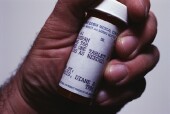Abuse antibiotics to make resistant bacteria
For years, although scientists have believed that excessive use of antibiotics will make the bacteria resistant to antibiotics, a recent study has provided more evidence. another.
Dr. Herman Goossens, lead author of the study published in the February 10 issue of The Lancet, said: 'There have been many studies showing a link between antibiotic use and status. drug resistance, but all those studies are based on indirect evidence. So far, no studies have been based on random selection, placebo control, or double blindness. Our study is the first study to show directly that the use of antibiotics leads to drug resistance. '
The study was conducted at the University of Antwerp Hospital in Belgium. Dr. Goossens is currently a professor of microbiology at this university.
 (Photo: Healthday) Mr. Goossens said: This study shows: 'antibiotics work well on bacteria and this effect can last for at least six months, and different antibiotics in the same one family may have significant different effects on these bacteria ".
(Photo: Healthday) Mr. Goossens said: This study shows: 'antibiotics work well on bacteria and this effect can last for at least six months, and different antibiotics in the same one family may have significant different effects on these bacteria ".
In the study, healthy volunteers were given azithromycin or clarithromycin, two macrolide antibiotics, and the third group received a placebo.
Periodically, the researchers tested samples containing Streptococcus bacteria taken from individuals in each group to see if the bacteria were resistant to macrolide antibiotics.
As expected, in the two groups receiving antibiotics, the level of resistance increased by about 50% after 8 days in the clarithromycin group, and increased by 53% after 4 days in the azithromycin group. Antibiotic resistance did not increase in the placebo group.
While azithromycin makes bacterial resistance increase slightly in a short time, clarithromycin seems to facilitate the survival of bacteria carrying the erm (B) gene, which seems to make the condition High resistance to macrolide antibiotics.
Both antibiotics have an effect on the rate of harmless naturally occurring bacteria in the mouth and the effect remains after 180 days.
Dr. Goosens notes: 'Other studies show that resistance genes can be transmitted among bacteria. They can spread to pathogens and cause problems such as ear infections and sore throats, thereby making them very difficult to treat. '
According to the researchers, the remaining message of the study is the message that experts have advised for a long time: 'Physicians need to consider the remarkable effects of antibiotics when prescribing them. for patients.'
However, the differences in resistance patterns between the two antibiotics that are closely related to each other, however, also help to call for more research.
Dr Stephanie Dance, a microbiologist at Southern General Hospital in Glasgow, Scotland, said the findings helped fill an important gap. She had an additional article about this study in the Lancet.
She said: 'Anyway, microbiologists already know the problem, but it's good to know the direct evidence. That's what we need. '
Dr. Dancer added: 'I, like my colleagues, really feel that the antibiotic (still effective) source is running out. This research is great because it provides concrete evidence to reinforce what we still suspect. '
Hong Linh
- Find a mechanism to help bacteria not only resist but also antibiotics
- Bad habits of parents hurt the liver and kidneys, endanger children
- Is it not necessary to take an adequate dose of antibiotics?
- 7 mistakes we often make when talking about antibiotics
- Bacterial alarms resistant to many antibiotics
- 'Heavenly' facts about antibiotics
- Discover more cases of antibiotic-resistant viruses in the United States
- Cinnamon will save disaster
- Bacteria resistant to two types of prophylactic antibiotics have been found in the United States
- Bacteria resistant to all drugs discovered in the US
- Video shows: Bacteria become resistant 1,000 times in just 2 weeks
- The danger that people still misunderstand can kill 10 million people every year
 Green tea cleans teeth better than mouthwash?
Green tea cleans teeth better than mouthwash? Death kiss: This is why you should not let anyone kiss your baby's lips
Death kiss: This is why you should not let anyone kiss your baby's lips What is salmonellosis?
What is salmonellosis? Caution should be exercised when using aloe vera through eating and drinking
Caution should be exercised when using aloe vera through eating and drinking